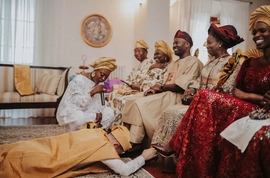
support@yorubalibrary.com
+2348073529208, 07038599574

Yoruba traditional marriage is culturally rich ceremony that reflects the deep-rooted heritage of the Yoruba people. Over the years, modern influences have shaped and modified these traditional practices. This article examines the elements of Yoruba traditional marriage and how contemporary trends have influenced these age-old customs.
Introduction to Yoruba Traditional Marriage
Yoruba traditional marriage is more than just a union between two individuals; it is a significant event that unites two families. This ceremony involves various rituals and activities that emphasize respect, honor, and the importance of family ties.
Key Elements of Yoruba Traditional Marriage
1. Introduction Ceremony (Momi N Mo): This initial meeting between the families of the bride and groom is a formal introduction and a chance for both families to express their intentions.
2. Dowry Payment (Idana): The groom's family presents gifts and a dowry to the bride's family. This gesture symbolizes appreciation and respect for the bride.
3. Engagement Ceremony: During this event, the bride and groom publicly declare their commitment to each other. It is filled with prayers, blessings, and cultural performances.
4. Traditional Attire: Both families wear traditional Yoruba attire, often made of colorful fabrics. The bride and groom typically don Aso Oke, a hand-woven cloth that signifies status and heritage.
Modern Influences on Yoruba Traditional Marriage
While many elements of Yoruba traditional marriage remain intact, modern influences have introduced changes to these practices.
1. Integration of Western Elements: It is common to see a blend of traditional and Western wedding practices. Couples often have a traditional Yoruba ceremony followed by a Western-style wedding. This fusion allows them to honor their heritage while embracing contemporary trends.
2. Digital Invitations and RSVPs: The use of digital platforms for sending invitations and managing RSVPs has become prevalent. This shift from physical invitation cards to digital ones reflects the impact of technology on wedding planning.
3. Customized Outfits: Modern couples often opt for customized traditional attire that combines traditional designs with modern fashion trends. This personalization allows couples to express their unique style while maintaining cultural significance.
4. Professional Event Planning: The involvement of professional wedding planners has increased, leading to more elaborate and organized ceremonies. These planners help incorporate modern aesthetics and conveniences into traditional weddings.
The Role of Media and Social Influence
Social media and global exposure have also played a significant role in shaping modern Yoruba traditional marriages. Couples share their wedding experiences online, inspiring others and setting new trends. Media coverage of high-profile Yoruba weddings has also contributed to the popularity and evolution of traditional marriage practices.
Conclusion
Yoruba traditional marriage ceremonies continue to be a cornerstone of Yoruba culture, celebrating the union of families and the preservation of heritage. Modern influences have brought about changes, but the essence of these ceremonies remains rooted in tradition. The integration of contemporary elements ensures that Yoruba traditional marriages stay relevant and appealing to the younger generation, while still honoring the rich cultural legacy of the Yoruba people.

Learn about the Yoruba concept of Ìwà Pẹ̀lẹ́ (good…

Learn special praises for Divine Being and Creator…